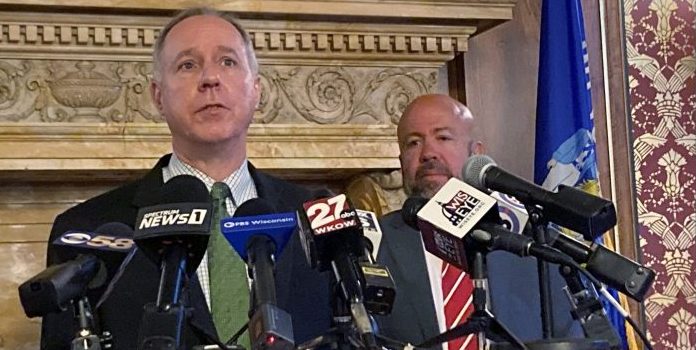(Headline USA) The Republican-controlled Wisconsin Legislature planned to send a dozen election- and voting-integrity bills to Gov. Tony Evers on Thursday in an attempt to rectify loopholes that led to suspicions of widespread vote fraud in cities like Milwaukee, Madison, Green Bay and Kenosha.
Republicans argue the fast-tracked bills are in response to deficiencies identified by a nonpartisan audit and a review by a conservative watchdog group.
But opponents claim the proposals go far beyond those recommendations and would fundamentally change how votes are cast and elections are run in the battleground state.
That’s why Evers, a Democrat facing re-election in November, has all but promised to veto them all. Republicans don’t have the votes to override his vetoes.
The bills up for final passage Thursday would:
- prohibit anyone other than the voter, an immediate family member or a legal guardian from returning an absentee ballot.
- bar election clerks from filling in any missing information on a voter’s absentee ballot envelope.
- require voters to provide a copy of a photo ID every time they request an absentee ballot. Under current law, voters only have to show an ID the first time they request an absentee ballot.
- give the Legislature control over guidance delivered to local election clerks by the bipartisan Wisconsin Elections Commission.
- empower a majority-controlled legislative committee to oversee federal money allocated to the elections commission.
- limit who can identify as indefinitely confined, a status that allows for absentee ballots for those who can’t get to the polls due to age, illness or disability.
- require the state to conduct checks to ensure that registered voters are United States citizens.
The Senate passed the bills on Tuesday, and the Assembly was taking them up on its last planned day in session this year.
Assembly Speaker Robin Vos said the bills were about addressing identified problems with the 2020 election and attempting “to guarantee that people have confidence in the election and the results that happen” going forward.
“We are focused on the future,” Vos said. “We are not looking backward about decertifying, or overturning, or doing anything with 2020.”
Although former President Donald Trump was leading considerably in the polls when many went to bed on election nights, deliveries of absentee ballots in the wee hours of the night helped give his challenger, Democrat Joe Biden, a narrow victory of nearly 21,000 votes in the official tally.
“Republicans are still obsessing over and relitigating the 2020 general election,” said Democratic Rep. Mark Spreitzer, prior to debate. “Instead of putting forward solutions … Republicans just want to be punitive and make it harder for people to vote.”
Vos, who met with Trump, ordered a taxpayer-funded investigation into the election that is ongoing. Vos had wanted its recommendations in time for the Legislature to consider them before its session ends next month, but lead investigator and former Wisconsin Supreme Court Justice Michael Gableman has not finished his probe.
The investigation has been mired in numerous, lawsuits from left-wing activists and political operatives challenging the legality of subpoenas Gableman filed with mayors of the state’s largest and most Democratic cities.
Republicans are attempting to circumvent Evers and go directly to the people with a constitutional amendment that would prohibit the use of private grants or donations to help run elections in the state.
It comes after oligarchs including Facebook CEO Mark Zuckerberg funneled nearly half a billion dollars nationwide into swaying the outcome by effectively taking over election administration in blue vicinities.
Wisconsin’s five largest cities received $8.8 million, but more than 200 communities in Wisconsin received funding as part of $350 million given out nationally by the Center for Tech and Civic Life.
Republicans were angered that the bulk of the money went to Democratic cities that voted for Biden. Examining how that money was used in Wisconsin is a focus of the ongoing investigation.
The amendment would need to pass the Legislature again next session, and be approved by voters as early as 2023, before being added to the state constitution.
Adapted from reporting by the Associated Press

